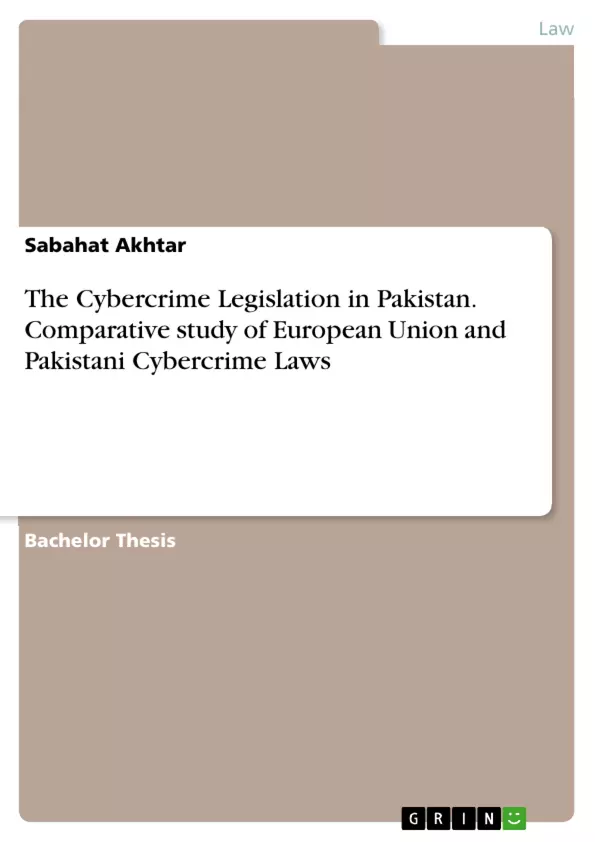In an increasingly interconnected world, where digital threats loom large, the urgent need for robust cybercrime legislation has never been more apparent. This insightful study plunges into the complex landscape of cybersecurity law, offering a rigorous comparative analysis of the legal frameworks in the European Union and Pakistan. Unveiling critical gaps and shortcomings in Pakistan's approach to combating cybercrime, this research embarks on a quest to fortify its defenses against evolving digital threats. Through a meticulous doctrinal analysis, the study dissects relevant EU regulations, scrutinizes various forms of cybercrime, and delves into the intricacies of Pakistani cybercrime laws, culminating in a comprehensive comparison of the two legal systems, enriched by relevant case studies. The findings expose significant disparities in cybersecurity infrastructure, highlighting the pressing need for Pakistan to modernize its legal arsenal. The research champions the enactment of updated and precise cybercrime laws, emphasizing the crucial imperative of keeping pace with rapid technological advancements to effectively address the escalating wave of cyber offenses. By pinpointing specific loopholes within the Pakistani legal system and proposing concrete strategies for improvement, this study provides a vital roadmap for strengthening cybersecurity and safeguarding the nation's digital future. This legal analysis serves as a cornerstone for policymakers, legal scholars, and anyone seeking to understand and address the ever-growing challenges of cybercrime in the digital age, advocating for essential legal reform and enhanced cybersecurity measures. It is essential reading for those navigating the complexities of cyber law, comparative law, and the ongoing quest for a secure cyberspace, as it offers pragmatic solutions to bolster cybersecurity challenges and fill existing lacunae within legal frameworks. Dive into the comparative legal landscape and discover the urgent reforms needed to protect nations in the digital age.
Table of Contents
- Abstract
- Conclusion
- Dedication
- Acknowledgment
Objectives and Key Themes
This dissertation aims to conduct a comparative study of cybercrime legislation in the European Union and Pakistan. It seeks to identify gaps and shortcomings in Pakistan's legal framework concerning cybersecurity and offer suggestions for improvement.
- Comparative analysis of EU and Pakistani cybercrime laws.
- Identification of lacunae in Pakistan's cybersecurity legislation.
- Assessment of the effectiveness of existing legal frameworks.
- Proposal of pragmatic solutions to address cybersecurity challenges in Pakistan.
- Highlighting the need for updated legislation to counter evolving cybercrimes.
Chapter Summaries
Abstract: This abstract provides background information on the increasing need for robust cybercrime legislation due to the widespread use of cyberspace. It outlines the research methodology, which involves a comparative doctrinal analysis of EU and Pakistani cybercrime laws. The study analyzes relevant EU regulations, examines various cybercrimes, focuses on Pakistani cybercrime laws, and compares the two legal systems, citing relevant cases.
Conclusion: This conclusion summarizes the findings of the dissertation, highlighting the significant gaps in Pakistan's cybersecurity infrastructure compared to the EU. It emphasizes the need for updated and more precise cybercrime laws in Pakistan, emphasizing the importance of keeping pace with technological advancements to effectively combat the rising number of cybercrimes. The research identifies specific loopholes in the Pakistani legal system and proposes ways to improve the legal framework to meet modern cybersecurity needs.
Keywords
Cybercrime legislation, European Union, Pakistan, comparative law, cybersecurity, legal framework, doctrinal analysis, lacunae, technology, cybersecurity challenges, legal reform.
Häufig gestellte Fragen
Was ist das Hauptziel dieser Dissertation über Cyberkriminalität?
Das Hauptziel ist eine vergleichende Studie der Cyberkriminalitätsgesetzgebung in der Europäischen Union und Pakistan. Die Dissertation zielt darauf ab, Lücken und Mängel im pakistanischen Rechtsrahmen in Bezug auf Cybersicherheit zu identifizieren und Verbesserungsvorschläge zu unterbreiten.
Welche Themenschwerpunkte werden in der Dissertation behandelt?
Die Themenschwerpunkte umfassen: vergleichende Analyse von EU- und pakistanischen Cyberkriminalitätsgesetzen, Identifizierung von Lücken in der pakistanischen Cybersicherheitsgesetzgebung, Bewertung der Wirksamkeit bestehender Rechtsrahmen, Vorschlag pragmatischer Lösungen zur Bewältigung von Cybersicherheitsherausforderungen in Pakistan und Hervorhebung der Notwendigkeit aktualisierter Gesetze zur Bekämpfung sich entwickelnder Cyberkriminalität.
Welche Forschungsmethodik wird in der Dissertation angewendet?
Die Dissertation verwendet eine vergleichende doktrinäre Analyse der EU- und pakistanischen Cyberkriminalitätsgesetze. Dabei werden relevante EU-Verordnungen analysiert, verschiedene Arten von Cyberkriminalität untersucht, der Fokus auf pakistanische Cyberkriminalitätsgesetze gelegt und die beiden Rechtssysteme verglichen, wobei relevante Fälle zitiert werden.
Was sind die wichtigsten Ergebnisse der Dissertation?
Die wichtigsten Ergebnisse zeigen, dass es im Vergleich zur EU erhebliche Lücken in der pakistanischen Cybersicherheitsinfrastruktur gibt. Es wird die Notwendigkeit aktualisierter und präziserer Cyberkriminalitätsgesetze in Pakistan hervorgehoben, wobei betont wird, wie wichtig es ist, mit dem technologischen Fortschritt Schritt zu halten, um die steigende Zahl von Cyberkriminalität effektiv zu bekämpfen.
Welche Schlüsselwörter sind mit dieser Dissertation verbunden?
Die Schlüsselwörter umfassen: Cyberkriminalitätsgesetzgebung, Europäische Union, Pakistan, vergleichendes Recht, Cybersicherheit, Rechtsrahmen, doktrinäre Analyse, Lücken, Technologie, Cybersicherheitsherausforderungen, Rechtsreform.
Was schlägt die Dissertation zur Verbesserung der Cybersicherheit in Pakistan vor?
Die Dissertation schlägt die Aktualisierung und Präzisierung der Cyberkriminalitätsgesetze in Pakistan vor, um mit den technologischen Fortschritten Schritt zu halten. Sie identifiziert spezifische Schlupflöcher im pakistanischen Rechtssystem und schlägt Wege zur Verbesserung des Rechtsrahmens vor, um den modernen Cybersicherheitsbedürfnissen gerecht zu werden.
- Arbeit zitieren
- Sabahat Akhtar (Autor:in), 2023, The Cybercrime Legislation in Pakistan. Comparative study of European Union and Pakistani Cybercrime Laws, München, GRIN Verlag, https://www.grin.com/document/1391182



